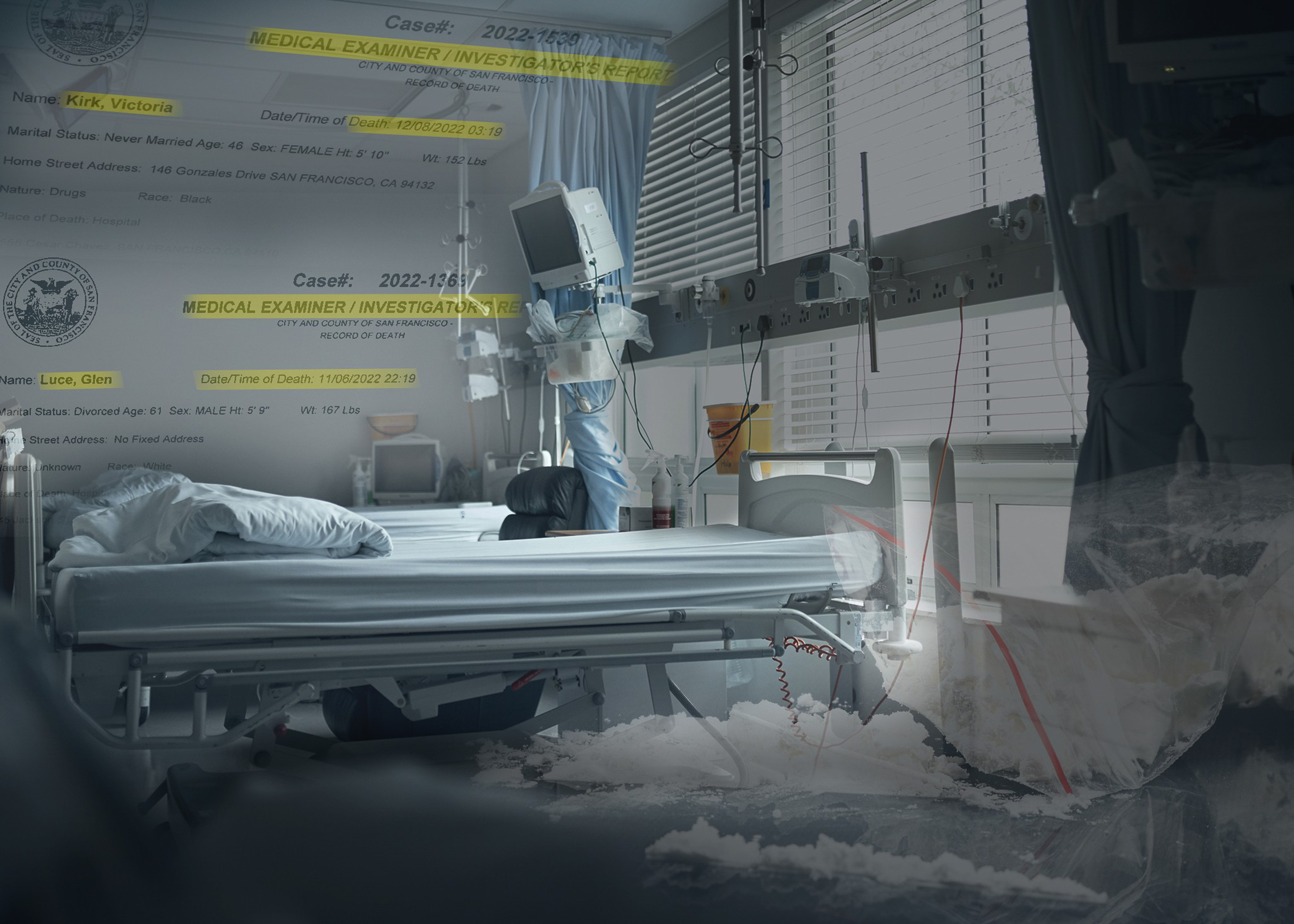Glen Luce checked into a San Francisco hospital with a sore leg just three hours before a doctor found him with his head stuck between the metal railings of his hospital bed.
The 61-year-old had summoned paramedics earlier that day due to pain in his leg and he seemed agitated, according to his death report. When Luce arrived at the hospital, he told the doctor about his history of using methamphetamine. However, after a dose of anti-anxiety medication and a short nap at the hospital, he returned to normal.
The doctor was preparing Luce for discharge when suddenly, the 61-year-old became tangled in the hospital bed, suffered a seizure and died.
The official cause of Luce’s death: a meth overdose.
Luce is just one in at least 10 people over the past three years who’ve fatally overdosed due to seizures and heart attacks while under medical care, according to death reports examined by The Standard. His family did not respond to requests for comment.
At a time when fentanyl is being blamed for most of the city’s overdose deaths, all these deaths occurred in hospitals across the city with one common theme: Every victim was found with cocaine and or meth in their system.

Victoria Kirk, a 46-year-old with a history of heart problems, walked into a Bernal Heights hospital with chest pain in December 2022. She told a nurse how she had used cocaine at her home in Park Merced. But a doctor gave her “a full workup without any significant findings” and prepared to release her. That’s when Kirk suddenly lost her pulse and died. Her death report pins the fatality on cocaine and meth use.
Victor Macias, 54, arrived at a Potrero Hill hospital in August 2020 with chest pain and a history of heart failure. Shortly after he arrived, Macias fell into cardiac arrest and was transported to the intensive care unit. Hospital staff were able to restore Macias’ heart rate, but his health continued to deteriorate and he died.
“Despite all [the] hospital’s lifesaving efforts, it was to no avail,” his death report states, finding Macias died from meth and cocaine.
In the first four months of this year, at least 125 people died of overdoses involving methamphetamine or cocaine in San Francisco. Many of these victims had also used fentanyl. But unlike opioid overdoses, which can be reversed with naloxone, there is no surefire treatment for someone dying from seizures or cardiac arrests linked to cocaine and meth use, according to experts.
Many hospital patients under the influence of meth or coke act aggressively toward hospital staff and create dangerous conditions for nurses, staff say. Hospital workers bemoan unsafe conditions inside emergency rooms across the city, describing constant abuse from patients.
Complicating matters further, some experts say these meth-related deaths shouldn’t be considered overdoses at all.
Dr. Phillip Coffin, director of substance abuse research at the Department of Public Health, said people who die of meth overdoses generally have underlying heart conditions, which he asserts are more to blame than the drugs.
“I think it’s a mistake for us to consider them as overdose deaths, from a public health perspective, because our interventions will be incorrect,” Coffin said.
Coffin said a lack of research on stimulant abuse often distorts the lens through which medical providers see these victims. He explained that the field of addiction science is relatively new and most efforts have gone toward the study of opioids.
“Many of the things that we recommend have very little evidence behind them,” Coffin said. “But we’re in a world where a lot of people are getting sick and we have to be innovative.”

Coffin said he hopes society can move away from using the word “overdose” to describe meth-related deaths caused by heart attacks or seizures because he believes it’s unfair to families and unhelpful for medical providers.
“It’s just the bean counters who are calling them overdose deaths,” Coffin said. “The family members, they don’t see them that way. They see them as premature deaths from cardiovascular disease.”
Luce, who died on Nov. 6, 2022, was passionate about fishing and spent time in Alaska working on commercial boats, according to an online obituary.
He’s remembered by a loving family and a best friend who blame his death on a stroke—not methamphetamine, the obituary reads.
